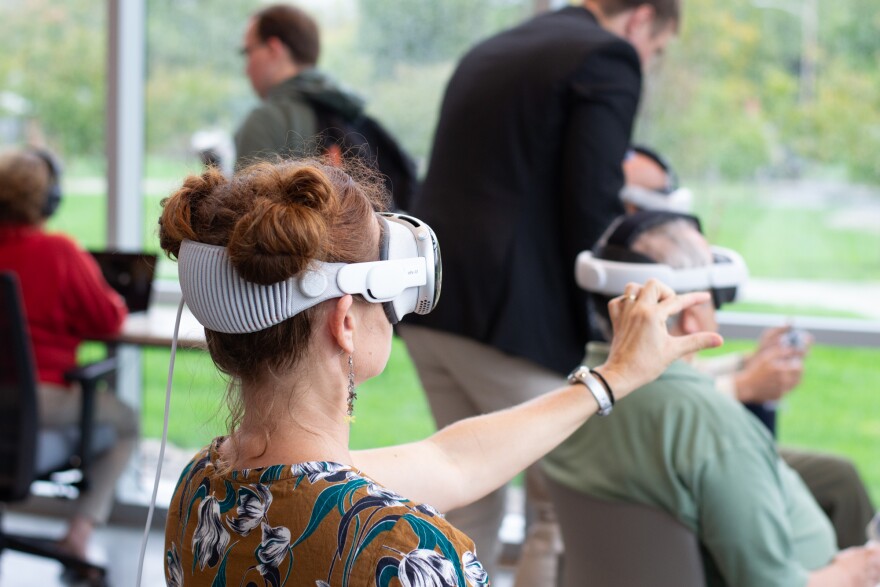In the midst of yet another contentious presidential election, faculty and students from Shenandoah University have created a virtual reality experience that transports participants into the debates that spawned the Constitution and created the electoral college. WMRA's Randi B. Hagi reports.
Imagine Philadelphia's Independence Hall in 1787 – the founders of the American government, in breeches and frock coats, lit by windows and candlelight, debating the structure of the House and the Senate, the perpetuation of the international slave trade, and how the new nation would elect its presidents.
[orchestra score]
ACTOR VOICING BENJAMIN FRANKLIN: Ha! Other delegates will dispute you. But that is how we make decisions. Let us join them.
A new virtual reality experience called "The Great Experiment" takes you there – and lets you participate. It was unveiled at Shenandoah University in late September.
[people talking, background music]

STUDENT: You can go ahead and put this on, and then you'll twist this [clicks headset strap] in the back to tighten it up to what fits you comfortably.
I tried on a VR headset and controllers. Scanning the Assembly Room in the get-to-know-the-delegates mode, I selected Roger Sherman, who told me about studying for the bar and his first wife's death.
Richard Fohrenbach came to give it a spin, too.
RICHARD FOHRENBACH: I had been to Independence Hall with my own children in Philadelphia, and the room looks remarkably the same!
The experience has increasingly interactive levels, where you end with debating the constitutional tenets yourself.

KEVIN HARDWICK: While VR has been around for a surprisingly long time, the broader project of narrating history in this medium is very much in its infancy.
Kevin Hardwick, who teaches history at James Madison University, was one of the project principals who spoke at the launch event.
HARDWICK: Our project has thrived on the contributions of engineers, historians, voice actors, voice directors, dramaturges … editors, debate coaches, marketing specialists.
That included the work of –
MOHAMMAD OBEID: North of a hundred students.
Mohammad Obeid is the co-director of the Shenandoah University Center for Immersive Learning, or SCiL.

OBEID: That also included building new facilities at SCiL. It included integrating The Great Experiment and its various components into classrooms across many disciplines.
Students photographed sculptures of the delegates, from which they modeled the 3D avatars that speak to you in the VR experience. They recorded voice actors reciting the founding fathers' words. Then they recorded movement actors portraying gestures and facial expressions that they mapped onto the avatars. Retired theater professor Sally Anderson and her dog, Macduff, directed the movement actors.
SALLY ANDERSON: They needed the bodies to get into the mocap suits to actually show on screen what those characters would be doing.
Mocap stands for motion capture. The actors had to be expressive while working within the parameters of the technology.
ANDERSON: They needed to submerse themselves, especially, into the words … and the emotions behind it. This is about government. Are you somebody who is gesturing all the time? You can't necessarily do that because they'd keep finding their hands disappearing!

The creators of The Great Experiment hope that virtual reality will impart a deeper understanding of this history and its implications than a textbook or documentary could. J.J. Ruscella came from a theater background, founded SCiL, and now works for his own immersive learning company, Access VR.

J.J. RUSCELLA: We have high school government students who need this. You want to know why? Because they're like me, man! I can't listen to a lecture and stay awake! [audience chuckles] I need to be occupied. I need to be active. I need to be involved in the learning.
The project has already inspired spin-offs. Michael Reynolds, who's studying VR design at Shenandoah, showed me his generative AI program. Users can chat with one of four founding fathers, and the AI generates responses based on that person's characteristics. While I talked to Reynolds, a young attendee was taking George Washington to task over why he enslaved people.
REYNOLDS: All AI has some kind of safety features, so if you ask, I don't know, Copilot … "How do I make napalm?" It will avoid that question. Same thing applies here. We had a history class come up to us while we were over at William & Mary … and … there was something about, I believe it was George Washington's teeth coming from slaves, and as the class was asking him … he would do his best to dodge the question because that's considered a sensitive topic.
Typical politician.

All jokes aside, The Great Experiment offers a chance to engage with these historical figures, and moreover, their ideas, which still shape our political system. History Professor Warren Hofstra was another leader on the project.
WARREN HOFSTRA: We are in an election year. The electoral college may become, once again, a flashpoint, a point of controversy. It will be, maybe, challenged. But the more people we can get talking about it, the more maybe we can contain whatever the aftermath of this election may present us.
The project was published in association with the University of Virginia Press — meaning it's gone through all the rigors, such as peer review, of any other piece of accredited historical scholarship. A "lite" version of the experience is now available for free for Meta brand headsets.


